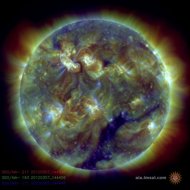Earth braces for biggest space storm in five years
 The brunt of the storm is expected to strike early Thursday and last through Friday, possibly garbling some of Earthlings' most prized gadgets but also giving viewers in parts of Central Asia a prime look at the aurora borealis, or northern lights, when darkness falls on Thursday.
The brunt of the storm is expected to strike early Thursday and last through Friday, possibly garbling some of Earthlings' most prized gadgets but also giving viewers in parts of Central Asia a prime look at the aurora borealis, or northern lights, when darkness falls on Thursday.
"Space weather has gotten very interesting over the past 24 hours," said Joseph Kunches, a space weather scientist with the National Oceanic and Atmospheric Administration (NOAA), on Wednesday.
Meanwhile, NASA warned of a "severe" storm event that would impact both the Earth and Mars as well as some key space agency satellites.
The fuss began late Sunday at an active region on the Sun known as 1429, with a big solar flare that was associated with a burst of solar wind and plasma known as a coronal mass ejection that thrust toward the Earth at some four million miles per hour (6.4 million kilometers per hour).
A pair of solar flares and a CME followed overnight Tuesday-Wednesday, setting off a strong geomagnetic and solar radiation storm registering at level three on a five-step scale.
NASA said the first of the two flares on March 6-7 -- classified in the potent X class and facing directly at the Earth -- was the biggest this year and one of the largest of this cycle known as the solar minimum, which began in early 2007.
In fact, it was second only to a stronger one that erupted in August, and the leading edge of the CME it sparked is expected to reach Earth at 0525 GMT on March 8, plus or minus seven hours.
"Such a CME could result in a severe geomagnetic storm, causing aurora at low latitudes, with possible disruption to high frequency radio communication, global positioning systems (GPS) and power grids," NASA said.
The solar flares alone caused brief high frequency radio blackouts that have now passed, according to NOAA.
The storm is likely "the strongest one since December 2006," Kunches said, noting, however, that the Earth experienced a stronger radio blackout last August.
"But en masse, if you put it all together with the geomagnetic effects and the solar radiation effects, I would put it on par with one at the end of the last solar cycle, which was over five years ago."
Satellites, power grids and even astronauts aboard the International Space Station could be affected by the radiation storm, which may cause them to seek shelter in better protected parts of the orbiting lab as they have in the past.
"Flight surgeons in Houston's mission control center have been monitoring the solar activity and will continue to do so," NASA spokesman Mike Curie said.
"They have determined that there presently is no concern for the six crew members aboard the International Space Station."
However, Kunches said some commercial airlines have already taken actions to reroute and fly further away from the poles.
And more such storms could follow in the coming days because region 1429 is expected to stay active, he said.
Geomagnetic and radiation storms are growing more frequent as the Sun leaves its solar minimum period and moves into a solar maximum over the coming years, but people are generally protected by Earth's magnetic field.
"The current increase in the number of X-class flares is part of the Sun's normal 11-year solar cycle, during which activity on the Sun ramps up to solar maximum, which is expected to peak in late 2013," the US space agency said.
However, some experts are concerned that because the world is more reliant on GPS and satellite technology now than it was during the last solar maximum, more disruptions to modern life are likely.
Space storms are not new. The first major solar flare was recorded by British astronomer Richard Carrington in 1859.
Other solar geomagnetic storms have been observed in recent decades. One huge solar flare in 1972 cut off long-distance telephone communication in the midwestern state of Illinois, NASA said.
Another similar flare in 1989 "provoked geomagnetic storms that disrupted electric power transmission" and caused blackouts across the Canadian province of Quebec, according to the US space agency said.
What the stars mean:
★ Poor ★ ★ Promising ★★★ Good ★★★★ Very good ★★★★★ Exceptional
Related Contents
Latest News
More News
- Russian President congratulates Vietnamese Party leader during phone talks (January 25, 2026 | 09:58)
- Worldwide congratulations underscore confidence in Vietnam’s 14th Party Congress (January 23, 2026 | 09:02)
- Political parties, organisations, int’l friends send congratulations to 14th National Party Congress (January 22, 2026 | 09:33)
- 14th National Party Congress: Japanese media highlight Vietnam’s growth targets (January 21, 2026 | 09:46)
- 14th National Party Congress: Driving force for Vietnam to continue renewal, innovation, breakthroughs (January 21, 2026 | 09:42)
- Vietnam remains spiritual support for progressive forces: Colombian party leader (January 21, 2026 | 08:00)
- Int'l media provides large coverage of 14th National Party Congress's first working day (January 20, 2026 | 09:09)
- Vietnamese firms win top honours at ASEAN Digital Awards (January 16, 2026 | 16:45)
- ASEAN Digital Ministers' Meeting opens in Hanoi (January 15, 2026 | 15:33)
- ASEAN economies move up the global chip value chain (December 09, 2025 | 13:32)

 Tag:
Tag:




















 Mobile Version
Mobile Version